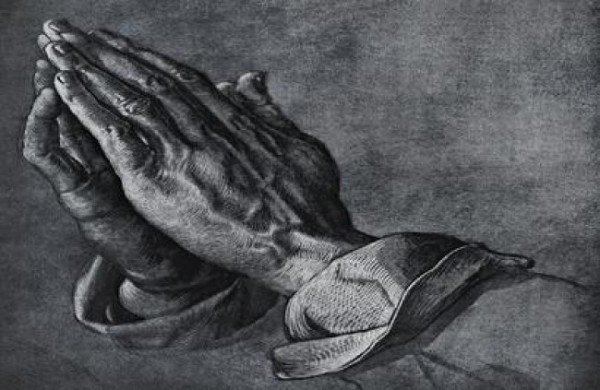We imagine Thomas even doubted himself.
When the other disciples said Christ had risen, this earnest empiricist first said, “unless I see” … then he realized it wasn’t enough. So he demanded to “thrust my hands into His side.”
For Thomas, seeing wasn’t believing.
But touch … that he had hopes for.
*
Seeing isn’t believing. Christians, for instance, know “believing is seeing” better expresses our faith — in fact, faith itself. We find tremendous depth in being people of the book, as it were. And one of the reasons is how close Jesus was to the people He was with. People touched him all the time. It remains something we cannot do.
Yet we still want to touch, in some way. But more than that, we are people of The Word, as He was.
And it’s true in much of life, in most ways, maybe in all: we want to touch.
• Consider our grandmothers, for whom it is never enough simply to see her children’s children. To see is the start of her oohs and tears, but quickly she will reach out to hold us. We love her for it.
• Though we buy many things online, we draw the virtual line somewhere. Books yes, and clothing perhaps (with a strong chance of return); food, not so much, and true love, never. Well we hope.
• Speaking of books, even electronic and unreal words must — they can’t escape it — involve touch. I’m typing these words by touch. You are reading them the same way.
It is the same in our faith, and why should it not be? We need to see and taste and hear and smell. And we want to. Why should we not want to touch?
Believing is seeing expresses our faith.
Yet faith without works, touch, is dead.
*
But aha! You’ve seen the flaw in my ointment, to misuse the idiom (detectable by seeing it in print).
By seeing it, you see.
Seeing is believing, we say. It happens all the time.
• The Hollywood Reporter writes how radical shifts in our views of homosexual relationships — perceptions both pro and con — change because of seeing them on television.
• Story itself, as told in TV images, in films, and even on billboard advertising as we whiz bang by at 75 miles per hour depends on powerful visual images that we the people believe.
• Despite the unreliability of memory, it persists as a main mode of explaining our world; what we see may be dear or deadening but either way we believe it. And it’s admissible in court.
Yes, images our powerful.
Seeing is believing works pretty well.
And yet those images, that seeing, still depends at some point on touch. Someone has to write the story or hold the camera or appear in person, and shake hands, to really connote the commitment claimed by your 30-second political ad.
The eyewitness must still appear in court, place hand on Bible, and be — if not actually touched by a jury or the attorney … at least touchable.
And consider this.
The Pixar magic, which we’d no doubt cite, laud, as the killer app example of the triumph of the visual, begins on paper. From “The Incredibles” (21,081) to “Ratatouille” (72,000) these movies start with the humble storyboard: the numbers cited refer to how many 3½-inch by 8-inch sheets of paper their artists hand-drew to first envision what we ultimately saw on-screen.
*
We know the phrase “I see that hand” as something a pastor will say when he calls for prayer, or when he calls for the altar. Here seeing and believing are linked different, and touch is not required.
Unless you want to actually pursue that decision you’ve just made. That’s going to involve touching some things — a Bible, say — and not touching others — a rather longer list, at least when we first set out. And have you ever lain hands on someone without touching them.
See (pardon the pun) we know better. We know simply to see something isn’t enough. We must touch it.
*
But to touch it lightly, the Church doesn’t know what to do with its hands. We know how to see (preachers at lecterns, videos on-screen), hear (same preaching, teaching, music), taste (communion, potlucks) and smell (incense, or at least a few candles). But touch … freaks us out. Occasionally we’ll greet each other (this is sometimes necessary to command, as an actual part of the service), and nearly all of us get baptized at one time or another. But touch … let’s not.
But this is changing. Christians have embraced the proximal, the physical. We’ve sought the nearly.
From books on the body published in the last few years, to the wider acceptance of spiritual formation — with its emphasis on the personal and corporeal, as well as corporate, practices — we are seeing a greater emphasis on, engagement with, what we actually do.
But what do we do it with?
Fingers and toes, skin and tongue — we touch a split second before we taste, as it happens. We often take Holy Communion in our hands before we taste it into our mouths. We feel the burn of the dying match … and then we smell the incense or candle. A drummer must drum, a strummer strum, first — and only then can we hear the sound or feel the beat.
The Word became flesh before He dwelt among us.
Before he lived, died, rose again, ascended.
In fact, before He did anything here.
He had to.
My thanks to Rachelle W. Chang
for spurring these thoughts.
